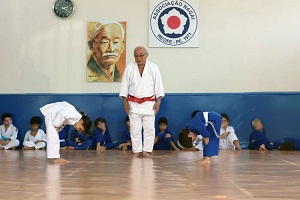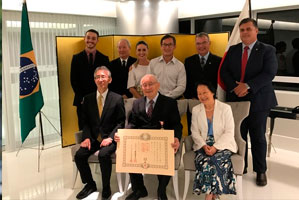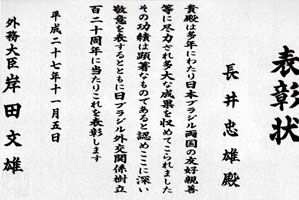

Tadao Nagai – 9th Judo Dan

Tadao Nagai receiving the Order of the Rising Sun, Gold and Silver Rays.

Tadao Nagai - Tribute from the Embassy of Japan.
Born on July 6, 1935, in the city of Avaré/SP, Tadao is the eldest son of Japanese immigrant farmers, Hiroshi Nagai and Asano Nagai and from an early age had to overcome the obstacles that life imposed on him to conquer his space as an athlete and professional Judo.
Tadao was only able to start his studies at 8 years old, when he went to live with a friend of his father's friend, in Pirajú, in the interior of São Paulo, when his family got the right to grow his own plantation and rented a farm near that city, but due to an illness suffered by his father, he had to return to the farm, from where it took 40 minutes on foot to get to school.
In the year 1946, at the age of 10, again with the intention of studying, he was taken to São Paulo by a friend of his father's, when he went to live at the home of Sensei Ryuzo Ogawa, who welcomed young students in the Liberdade neighborhood at his academy. Judo and everyone who lived there trained.
Not everyone found it easy to adapt to the energetic system of Sensei Ogawa and the custom of participating in the chores of the home and the gym. Cleaning the bathroom, taking care of the Judo room, tidying up the room and sweeping the yard, were the inmates' responsibility, as all housekeeping and maintenance work at the gym was performed by them and inspected by Sensei Ogawa.
However, Tadao Nagai, used to dealing with heavy work, as he had worked in the fields together with his parents and brothers, soon adapted to the rules of the house and Judo began to flow naturally and his aptitude for fighting, coupled with his physical strength and natural abilities, made him stand out among his peers, because fighting, as he says, was with himself and therefore, his short stature did not hinder him at all, although at that time there was no division of category of weight in Judo.
However, there was a certain period of demotivation regarding sport, but he was encouraged by his father and friends to continue in Judo and not to abandon his gift.
Thus, he followed the advice received and at the age of 15 he became the youngest Black Belt of the time. Always striving, and with the desire to help his family, Tadao studied during the day, trained at night and also, in parallel, studied the Japanese language.
When he finished the basic course in 1952, thinking of helping to reduce his parents' expenses, he decided to leave his studies and return to his family, in the interior of São Paulo and returned to work in the fields.
However, at the insistence of Sensei Ogawa for him to return to the capital of São Paulo, he returned after a year, but with the desire to work outside the academy, in order to obtain resources to help his family, as he felt that this responsibility should be his, since he was the eldest son, among the 13 brothers, however, in order not to displease his Sensei, he just continued studying and helping at the gym.
When he finished the Technical Course in Accounting in 1955, despite the will of Sensei Ogawa, who did not want to see him work outside the Academy, Tadao, at 19, decided to face life according to his aspirations.
But in order not to hurt his Sensei, he decided to lie and make the excuse that he would live and work with his uncle and went to live in a pension. However, soon Sensei Ogawa discovered the lie and “forced” him to return to the gym, but this time, he accepted that he worked outside, but Tadao continued to assist his Sensei, in his spare time.
Although he took the entrance exam and entered the Higher Course in Economic Sciences in 1958, Nagai was unable to complete the course, due to so many chores that he performed at the same time, as Judo took him most of the day, with intense participation in competitions and he was still a Federal Public official at the Brazilian Coffee Institute (BCI).
His career as an athlete earned him a lot of titles, including Champion of São Paulo in 1955, Champion of Paraná and runner-up of the Japanese Colony, Suzano / SP, in 1956 and Brazilian Champion and of the Budokan Black Belt Tournament in 1957, when he joined the São Paulo Judo Team.
At the International Judo Tournament held at the Ibirapuera Gymnasium in São Paulo, among the teams from Brazil, Japan and Argentina, he was considered by the Kotani master of Kodokan Japan, the most technical athlete of the competition, being then honored with a trophy of Honor to the merit.
In 1959, he was runner-up in the absolute Paulista and three-time university champion (1958, 1959 and 1960) defending the Faculty of Economics, Finance and Administration of São Paulo. In 1960, with knee problems, he withdrew from competitions, but later, with the rise of the weight category division, which until then had not existed, Tadao decided to compete again, even with the problem that had kept him from the mats and he started to fight in the Super-Light category and again became São Paulo and Brazilian Champion.
In 1961, in partnership with the master Toranosuke Ono, Tadao Nagai founded the São Paulo Budokan Association, in the Liberdade district, in São Paulo and began to reveal great names of Brazilian Judo, among them the Sensei Harada, which today belongs to Kodokan do Brazil, Keichi Kohara, Waldir Meleiro, Sadao Fleiming, Kenzo Mastsura, Salomão Rotenberg, Takanori Sekimi, Fitoshi Tamura, Paulo Murakawa, Romano Anziloti, Wataru Ueda, among many more.
As a director, he was president of the Budokan Black Belt Association, second treasurer of the FPJ - São Paulo Federation Judo, under President Lucio Moreira Franca and also Vice President for President Katsuhiro Naito.
In 1964, he represented Brazil in the Pre-Olympic Tournament held in New York, when he won the bronze and the call for the Brazilian National Team / Olympics in 1964, but he never got to participate in the Olympics because his catechism was cut. To this day, Tadao is not sure why he was cut, but it is rumored that the decision was based on age.
Tadao Nagai remained in this routine until she turned 30, when she decided to marry Mrs. Shisako Nagai, better known as Dona Edite, who is also the daughter of Japanese immigrants.
From this union, Elcio Kazuo Nagai was born, Sergio Tadashi Nagai, Silvana Harumi Nagai and Silvio Teruo Nagai, all judokas, who with the same “vein” as their father, were several times champions Pernambucano and Estudantil.
Elcio Kazuo, the couple's first son, despite his talent for Judo, let his passion for computers speak louder and works in the area of Information Technology in São Paulo, but the other children followed in the footsteps of Tadao and are Judo teachers.
Shortly after the birth of her second child, Tadao Nagai was transferred to Recife in 1970 by the Brazilian Coffee Institute and decided that he would leave Judo to dedicate himself exclusively to his work and family, but love by Judo he did not let him resist the insistent invitations he received from Dr. Williams Arruda, then president of the Pernambuco Pugilism Federation, which governed Judo in Pernambuco, at that time.
Thus, yielding to the invitations and to his own feelings, Tadao Nagai promoted a true revolution in the judo of Pernambuco, imposing a new order, a new direction, a new teaching system, based on philosophy, pedagogy, technique and also physical training of its athletes and established a milestone in Pernambuco judo, which can be divided into before and after Tadao Nagai.
Then, in 1971, Nagai founded his own academy, the Nagai Association of Judo, which has already formed hundreds of black belts and passed by several prominent athletes from State, National and International, including the three-time Brazilian champion Arthur Castelo Branco and athletes Gabriel Pinheiro, Mariana Barros and Katherine Campos, who made up the Brazilian judo team several times. Other students followed the educational bias and today spread Judo in their academies and reveal new athletes on the national scene, such as Sensei Carlos Tevano, who comes year after year contributing to the growth of Judo Pernambucano.
In 1987, Sensei Tadao Nagai led the Brazilian team to the title of Pan American Judo Champion, as head of the Brazilian Youth and Junior delegation in Mexico.
Today, 9th DAN, in the tranquility of his mission accomplished, Sensei Tadao Nagai speaks out loud: “What I am today I owe to the Ogawa family and my parents who were my great supporters and responsible for all my trajectory in Judo and in life.
My achievements were with a lot of work and sacrifice, so my message to those who are starting is that everyone should try to accomplish what they want with work and sacrifice, because the lack of time is no excuse, what is lacking is determination . The achievements acquired with sacrifice, despite being exhausting, are more valued. In life you need perseverance.
I have my children trained, who are continuing my work, I will continue on this journey as long as life allows ”.
In 2019, Tadao Nagai received from the Consul General Maruhashi the Order of the Rising Sun, Rays of Gold and Silver, from the thirtieth year of the Heisei Era, therefore decorated with the title of Commander, another deserved title to our Sensei Tadao Nagai, who had already, on another occasion, received a tribute from the Japanese Embassy in Brail.
Malacacheta Social Project - Complexo do Alemão